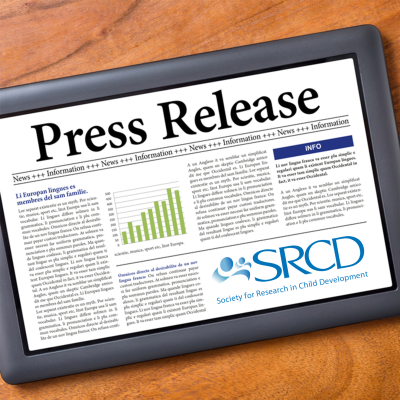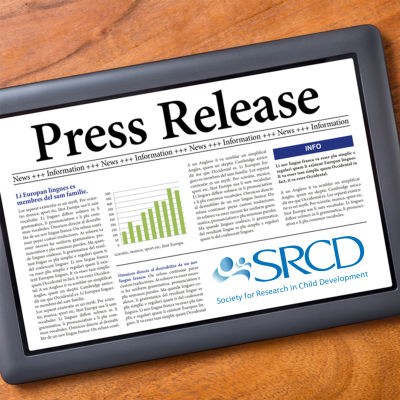Investing in Our Future: The Evidence Base on Preschool Education
PRESS RELEASE / CHILD DEVELOPMENT: Embargoed for Release on October 16, 2013
The expansion of publicly-funded preschool education is currently the focus of a prominent debate. The research brief “Investing in Our Future: The Evidence Base on Preschool Education,” authored by an interdisciplinary group of early childhood experts, reviews rigorous evidence on why early skills matter, which children benefit from preschool, the short- and longterm effects of preschool programs on children’s school readiness and life outcomes, the importance of program quality, and the costs versus benefits of preschool education.
The research brief was funded by the Foundation for Child Development and produced in collaboration with the Society for Research in Child Development.
“Scientific evidence on the impacts of early childhood education has progressed well beyond exclusive reliance on the evaluations of the Perry Preschool and Abecedarian programs,” according to Dr. Hiro Yoshikawa, a professor at New York University’s Steinhardt School and lead author of the brief. “More recent evidence tells us a great deal about what works in early education and how early education might be improved.”
“The recent evidence includes evaluations of city-wide public preschool programs such as those in Tulsa and Boston,” according to Dr. Deborah A. Phillips, a professor of psychology at Georgetown University and a co-author of the brief. “Evaluations of these programs tell us that preschool programs implemented at scale can be high quality, can benefit children from a range of socioeconomic backgrounds, and can reduce disparities.”
According to the authors, the current science and evidence base on early childhood education shows that:
- Large-scale public preschool programs that are of high quality can have substantial impacts on children’s early learning. For example, at-scale preschool systems in Tulsa and Boston have produced gains of between half and a full year of additional learning in reading and math.
- Quality preschool education is a profitable investment. Benefit-cost estimates based on older, intensive interventions, such as the Perry Preschool Program, as well as contemporary, large-scale public preschool programs, such as the Chicago Child-Parent Centers and Tulsa’s preschool program, range from three to seven dollars saved for every dollar spent.
- The most important aspect of quality in preschool education is stimulating and supportive interactions between teachers and children. Children benefit most when teachers engage in interactions that support learning and at the same time are emotionally supportive. Importantly, in existing large-scale studies, only a minority of preschool programs are observed to provide excellent quality and levels of instructional support are especially low.
- A key pathway to quality is supporting teachers in their implementation of instructional approaches through coaching or mentoring. The evidence indicates that coaching or mentoring teachers on how to implement content-rich and engaging curricula can increase stimulating and supportive interactions as well as boost children’s skills.
- Quality preschool education can benefit middle-class children as well as disadvantaged children. The evidence is clear that middle-class children can benefit substantially, and that benefits outweigh the costs for children from middle-income as well as those from low-income families. However, children from low-income families benefit more and therefore universal preschool can reduce disparities in skills at school entry.
- Long-term benefits occur despite convergence of test scores. As children from lowincome families in preschool evaluation studies are followed into elementary school, differences between those who participated in preschool and those who did not on tests of academic achievement are reduced. However, evidence from both small-scale, intensive interventions and Head Start suggest that despite this convergence on test scores, there are long-term effects on important societal outcomes such as years of education completed, earnings, and reduced crime and teen pregnancy.
The authors of the research brief will be discussing their findings at an upcoming event, “Too Much Evidence to Ignore: New Findings on the Impact of Quality Preschool at Scale,” which will take place from 1:00 to 3:00 PM on October 16, 2013, at the New America Foundation in Washington, DC. Click here for more information on the event. Twitter hashtag: #toomuchevidence.
Television and radio studio availability at the event: A studio feed is available for television or radio reporters. The New America Foundation operates a ReadyCam remote studio unit via videolink in Washington, DC, with the capacity to connect for live or recorded interviews. For further details about booking studio time, or any other media-related matters, please contact Ross van der Linde on (202) 596-3602, (609) 937-9876, or vanderlinde@newamerica.net.
To read the full research brief or speak with the brief’s authors, please contact Sarah Mancoll at (202) 289-7905 or smancoll@srcd.org.
ABOUT THE FOUNDATION FOR CHILD DEVELOPMENT
FCD is a national private philanthropy dedicated to the principle that all families should have the social and material resources to raise their children to be healthy, educated and productive members of their communities. www.fcd-us.org.
ABOUT THE SOCIETY FOR RESEARCH IN CHILD DEVELOPMENT
SRCD is an interdisciplinary and international organization of developmental scientists that seeks to promote interdisciplinary research in child development, to foster the exchange of ideas among scientists and other professionals of various disciplines, and to encourage applications of research findings to improve the lives of children, youth and families. www.srcd.org.
ABOUT THE NEW AMERICA FOUNDATION
New America Foundation is a nonprofit, nonpartisan public policy institute that invests in new thinkers and new ideas to address the next generation of challenges facing the United States. www.newamerica.net


